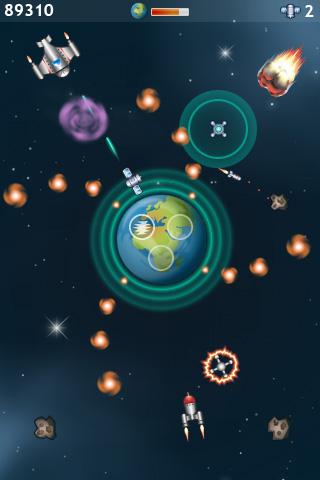
Given the number of satellites that circle the earth, it's conceivable that one of them may have saved your life.
Perhaps it got in the way of some tiny meteor destined to crack you round the bonce while you were out walking, or successfully helped direct you to the nearest shop selling Monster Munch at a time of need.
These satellites aren’t designed as defensive machines, though. Their job is to relay GPS signals and spy on you.
For real defensive power, look no further than Orbital Defender.
Space, manAs the name suggests, the game falls firmly into the defence genre, and offers very few surprises for the seasoned protector of castles/headquarters/planets. What it does offer is a very tight challenge.
You play as a satellite orbiting a planet in the centre of the screen. By tapping the screen in any direction you can fire at any incoming threats. Meteors, asteroids, and alien craft all qualify as space fodder.
The trick is that you can’t control the speed at which you orbit, or change your satellite’s course in any way.
This means you can’t fire over or past the planet you’re defending without quickly pulling a Grand Moff Tarkin. As in life, the aim is to avoid accidentally blowing up your own planet.
This leads to some tense moments as you wait to clear the horizon and get a shot off at a rock that is drifting slowly but surely towards the atmosphere. These moments only last two seconds but there are a lot of them.
Cosmic castawayThis tension is only compounded by the fact that your planet’s health doesn’t recharge between levels, and nor does it reset if you fail and try again.
Instead, the levels come in batches of five – the first five are on Mercury, the next five are on Venus, and so on – so if you take any damage early on the scars will stay with you until you reach the next planet.
It’s a tough feature, and it means you have to rely completely on the new weapons, shields, and repair power-ups that drift into your firing range from time to time.
You’ll get lasers that fire faster, missiles with a (somewhat tricky) homing ability, and perimeter drones that act like remote turrets.
Yet even all those are sometimes inadequate when you're faced with wave after wave after wave of multiplying alien dropships. Don’t be misled by the simplicity of its concept. Orbital Defender is a hard game.
Sat naffIf anything is wrong with it, it’s that it can sometimes be too hard, not to mention a little awkward to control.
Backtracking to the first level of your current batch and retrying the whole lot is often the only way to make it through to the final stage with enough health saved up.
Also, your west and east flanks feel overly vulnerable because there's less room for them on-screen and therefore less time to see things coming.
For the most part these flaws can be overlooked. Your pain threshold will do a lot to determine whether or not you enjoy your time aboard the good ship Orbital Defender.
But even for the more easy-going amongst us, it’s a worthy and well engineered craft.
Orbital Defender

